Why peppers don’t grow: possible causes of the problem and methods for solving them
Often, summer residents are faced with the fact that after planting in a greenhouse or a warm bed, peppers do not grow, although they have sprouted well. The agricultural technology of this crop has its own subtleties, knowing which farmers can reap a high yield even from a small plot.
If the peppers stop growing for no apparent reason, it is important to take a number of measures, which we will discuss in detail in the article.
Why don't peppers grow?
There are many reasons why vegetables do not grow or set. Seedlings are affected not only by their care, but also by improper sowing. Salad (or bell) peppers come from Latin America. This heat-loving plant experiences stress from various external factors.
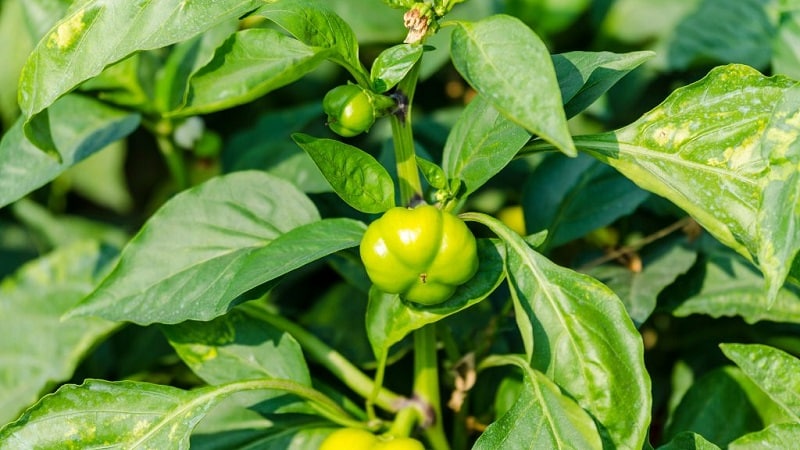
If low-quality or empty seeds are chosen for planting, the plants will develop poorly. Attention is paid to both picking and choosing a location on the site. Peppers do not like temperature changes and shading; they need a large amount of moisture and regular feeding.
Why don't they sprout?
Seeds will not germinate if the soil and planting material are incorrectly selected. Plants love loose, neutral soil with an acidity of 5–7 pH. Such soil allows water and oxygen to pass through well, resulting in optimal conditions for seed germination. Myself planting material buy in a specialized store.
To prepare soil at home, take in equal parts:
- ready-made humus or compost;
- turf land;
- leaf humus;
- peat.
After disinfection, the grains are soaked in a nutrient solution for four hours., then germinate. Seeds are not stored for a long time, otherwise they will not germinate. If you follow the recommendations, the first shoots will appear in 5–10 days.
Reference. To speed up the germination of seeds, they are pre-treated in potassium permanganate.
It is important to accurately determine the time of sowing seedlings. Early varieties are sown 65 days before planting in open ground, late varieties - 75 days.
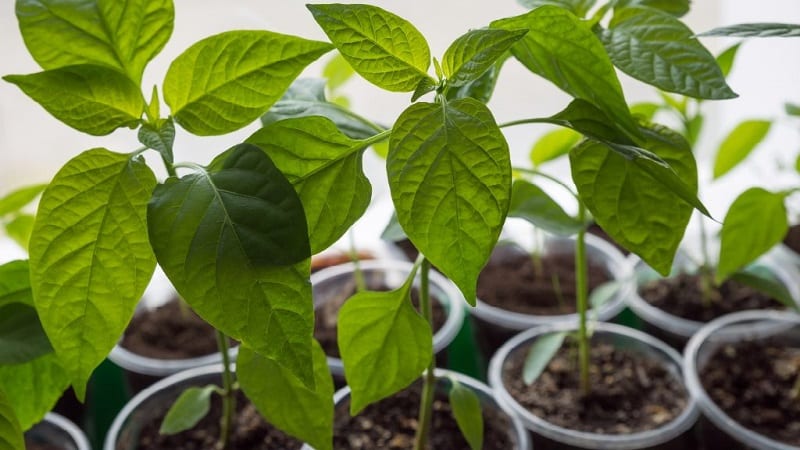
Seedlings do not grow - reasons
After germination, the boxes with seedlings are moved to a well-lit place with a temperature of +22°C. If the seedlings grow poorly, it means that the temperature regime is not maintained. Pepper is a heat-loving plant that does not like drafts.
Slows down crop growth and overdried soil, if you keep boxes of seedlings next to the battery. In such soil, the hatched seeds dry out.
Incorrect picking is another reason for poor growth. Peppers have a delicate root system, so they are planted not in a common box, but in separate containers. When picking, seedlings often die. If the seeds are planted in a common box, then they are replanted using the transshipment method. Do not deepen the roots - this will slow down the growth of seedlings.
Seedlings are regularly watered with warm water: Cold will only create stress for the bushes.
Why have they sprouted but not grown?
One of the reasons for this is a violation of the temperature regime. During the day, at the seedling stage, the temperature is maintained at least +22...+25°C, at night - at least +10...+12°C.
Seedlings are regularly fertilized and water, not allowing the soil to dry out.
Causes of pepper growth problems
Common reasons for cultural slowdown:
- low air temperature and drafts;
- infertile soil;
- picking errors;
- constant temperature changes;
- deepening of seedlings during transplantation;
- irregular watering;
- damage to roots during transplantation;
- irregular feeding;
- inappropriate time to dive;
- too dry air in the greenhouse;
- poor lighting and short daylight hours.
They dive the crop into the ground using the transshipment method; the roots are also not deeply buried. Otherwise, the plants will spend their energy on growing adventitious roots on the lower part of the stem and green mass, rather than the fruits themselves. As a result, productivity will decrease.
Important! Pepper is given as little stress as possible so that he can better adapt to new conditions.
If the plant is too deep, wait for adventitious roots to appear, and do not repeat this mistake next season.
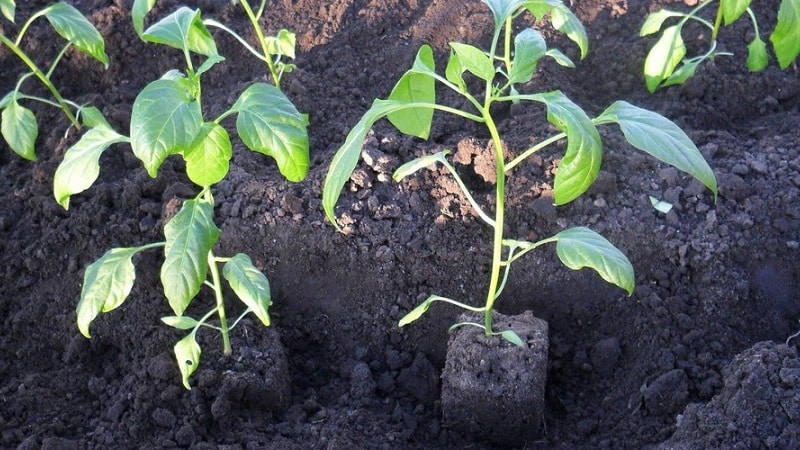
Agrotechnical errors
This garden crop is often not fed. An excess of nutrients is just as harmful as a lack of them. Excess superphosphate leads to increased growth of the root system, as a result of which the plant lags behind in development. To reduce the concentration of fertilizers, increase the frequency of watering.
Before planting in a permanent place, prepared humus is added to the soil. After that peppers are fed several times a season:
- two weeks after the picking - mullein infusion;
- at the end of June, when the crop blooms, wood ash diluted in water and infused for three days;
- after three weeks - mineral fertilizers with potassium and calcium (will increase plant resistance to disease);
- at the fruiting stage, every 1.5 weeks - complex fertilizers.
External factors
Environmental factors also influence plant growth retardation.:
- drought;
- excess moisture;
- lack of sunlight;
- pests;
- illness;
- temperature changes;
- drafts.
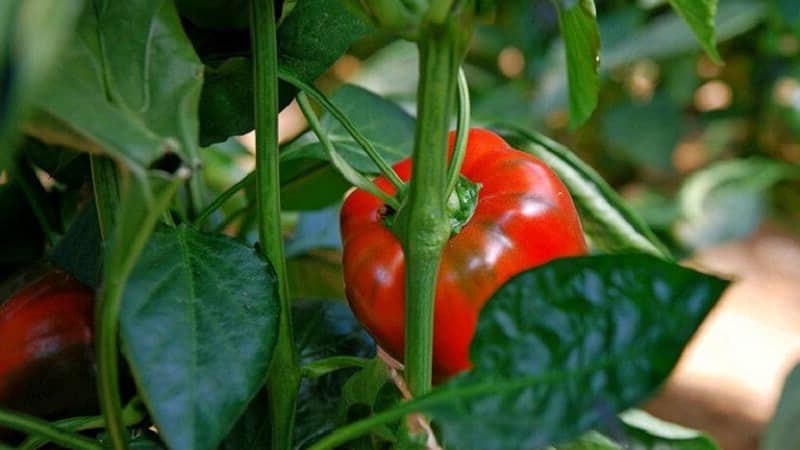
Especially often, a slowdown in development occurs due to lack of moisture.. After each watering, the soil is loosened and mulched. In a greenhouse, bushes are moistened after 1-2 days, in open ground - after 3-6 days. In hot weather, the procedure is carried out every day, in the morning or evening.
Read also:
The best varieties of sweet peppers for open ground
Diseases and pests
With high humidity, plants are at risk of white or gray rot. Peppers can become infected with soil diseases:
- late blight;
- fusarium;
- verticillium.
The danger is pests:
- aphid;
- whitefly;
- scoop;
- thrips;
- Colorado potato beetles;
- mole crickets.
To combat them they use insecticides (Bankol, Grom, etc.) and biological products.
Reasons specific to greenhouses and greenhouses
Bush growth slows down in the greenhouse due to drafts, too dry air or excess humidity. Therefore, structures are ventilated after watering, and beds are covered with transparent film in cold weather.
High humidity leads to mold and rot, slugs.
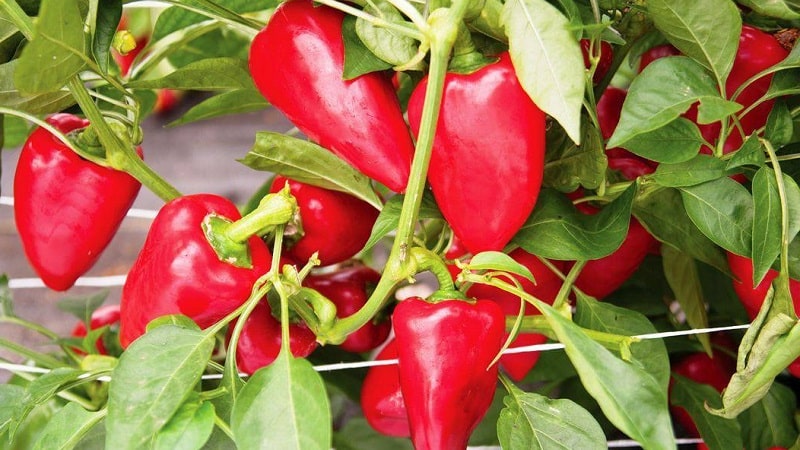
For open ground
A common reason for stopping the development of vegetables in garden beds is sudden temperature changes., so gardeners install arcs and cover plants with protective material or transparent film. It must be removed in hot or windy weather during the day and pulled on at night.
Important! In open ground, peppers are more susceptible to attack by pests.
What to do
To combat the lack of moisture, after each watering the rows are loosened and mulch is added.. For intensive growth at each growing season, the crop is fed with organic and mineral fertilizers.In cold weather and in unfavorable climates, the bushes must be covered with film.
At the first signs of diseases and pests plants are treated with special preparations.
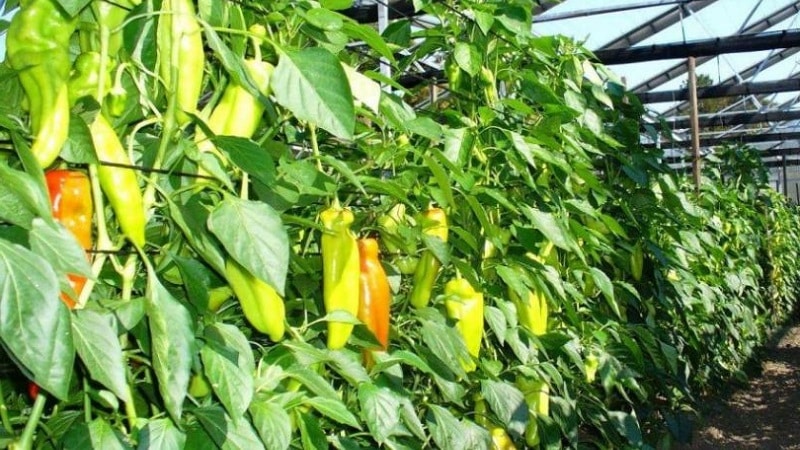
Preventive measures
To prevent the problem, it is important to follow the recommendations for cultivating vegetablesstarting from the moment of sowing. The stronger the seedlings, the faster the plants acclimatize after planting in open or closed ground.
Any cause of growth retardation is removed, and the bushes are sprayed with biostimulants. Follow the rules of crop rotation: the best predecessors of peppers are melons, legumes, onions, cucumbers, cabbage, zucchini.
Conclusion
Peppers are a capricious crop for the Russian climate, but breeders have developed many early-ripening varieties and hybrids that are suitable not only for the middle zone, but also for the Urals and Siberia.
To cultivate vegetables, the soil is properly prepared, the seeds are processed, a consistently high temperature and optimal humidity are ensured, and the bushes are protected from drafts. Compliance with the peculiarities of agricultural technology will allow you to obtain a stable harvest of sweet peppers on your site.